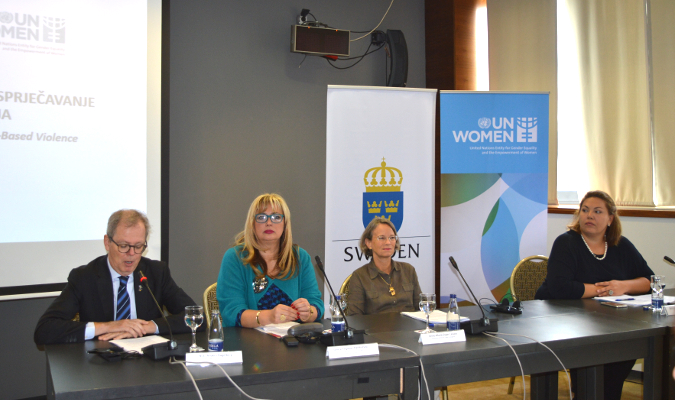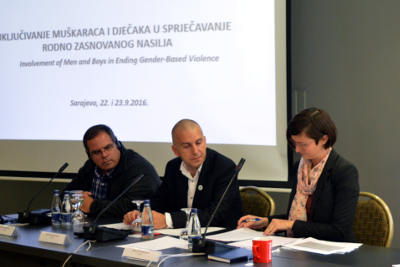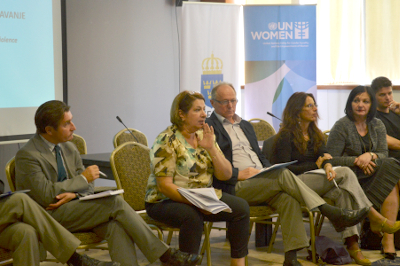Sarajevo conference examines the role of men and boys in ending violence against women
Changing destructive ideals of masculinity and getting men and boys to hold their peers accountable said to be key to ending gender-based violence.Date:

A recent international conference in Sarajevo on involving men and boys to end gender-based violence motivated professionals, stirred new ideas and informed future work on gender based violence in Bosnia and Herzegovina.
Organized by UN Women in Bosnia and Herzegovina and the Embassy of Sweden, the conference is part of the larger UN Women programme Standards and Engagement for Ending Violence against Women and Girls in Bosnia and Herzegovina, financially supported by the Swedish International Development Cooperation Agency (SIDA).
Half of all women have been subjected to some form of violence in Bosnia and Herzegovina. A serious violation of basic human rights, violence against women and girls is widespread here, and often seen as socially acceptable behaviour justified by traditional patriarchal concepts.
“We men must see ourselves and other men as agents of change, especially when it comes to changing destructive ideals of masculinity. Gender equality has benefits not only for women and girls but for all of us,” said H.E. Anders Hagelberg, the Ambassador of Sweden to Bosnia and Herzegovina at conference.

Alan Greig, a gender specialist and author of the UN Women booklet, Understanding Masculinities and Violence against Women and Girls, said patriarchy was a root cause of gender-based violence.
“Gender-based violence is patriarchal violence, and men and boys have been privileged by patriarchy. We have to teach men and boys to hold other men and boys accountable for their behaviour,” said Mr. Greig.
Work with perpetrators of violence is in its initial stages in Bosnia and Herzegovina and has so far been spearheaded by civil society organizations, with institutional support gaining traction.
UN Women is working with partners to strengthen both the institutional and social response to violence against women and girls to improve multi-sectoral services available to survivors of violence, while also supporting Be A Man clubs and others who work with potential perpetrators of domestic violence like.
“Young men justify violence. Through Be A Man clubs, we work on changing attitudes, raising awareness and building knowledge on a peer-to-peer level. Once boys find their place in the club, their attitudes begin to change. They turn from violent boys to peer educators,” said Feđa Mehmedović from Association XY, one of the advocates in the United Nations Secretary General’s UNiTE Campaign to End Violence against Women and Girls and the global campaign HeForShe.

Gordana Vidović, director of the Budućnost organization, urges outreach to men and boys, including in prisons: “Only through continuous work with perpetrators of violence can substantial change happen. Better cooperation among institutions and civil society organizations is needed to reach perpetrators of domestic violence.”
An important part of UN Women’s work to end violence against women involves assisting the Government of Bosnia and Herzegovina implement the global norms and standards enshrined in the Council of Europe (CoE) Istanbul Convention. This obliges states to address and prevent violence against women and girls, take measures to protect victims and prosecute perpetrators.
“Public institutions such as police, centres for social work, health centres, judiciary and schools have the most important role to play in implementing the Istanbul Convention,” said Anne-Marie Esper Larsen, UN Women Representative in Bosnia and Herzegovina. “It is essential that these institutions coordinate their efforts and work together strategically and exchange knowledge on issues that are crucial for ending gender-based violence such as involving men and boys.”